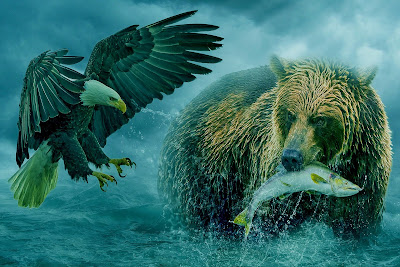One day the Bear and the Terrapin were talking about the story there grandparents used to tell them. How the animals had lost to the birds in a ball game. The Bear and Terrapin still could not believe it was true. Thus, they decided to put together a new game between the birds and the animals. The game this time would be a full-length game of American Football.
The animals gathered their team which included the Bear, Terrapin, Deer, Hog, Golden Retriever, and others. Once again, just like the grandparents before them they said no to the small animals. The Bear would play quarterback and captain the team. They were confident they would win the game.
The birds would be quarterbacked by the Eagle. Football was difficult for the birds to play because they had no hands. However, they had strong beaks and were able to catch in that way. Once again, the smaller animals came to the birds and asked to play with them. The birds accepted them whole-heartedly and helped design protective suits of armor so that they would be protected from the larger animals.
The game was a defensive battle. After 3 quarters the game was tied 10 - 10. The Bear had thrown a touchdown pass to Golden Retriever, and Deer kicked a field goal for the animals. On the other side, Eagle through threw a touchdown pass to Flying Squirrel, and Rooster kicked a field goal.
The game was winding down and the animals had the ball. Bear dropped back to pass and threw it deep towards Deer. But out of nowhere swooped Martin who intercepted the pass and returned it for a touchdown. This sealed the game for the birds (and small animals). They had done it again! The animals went home in despair and would tell their kids and grandkids the story of their defeat for many centuries. Maybe next time...
*Author's Note: This story is based off of a Cherokee Myth. In this myth, the animals and birds play a ball game. In this game, one of the teams just has to get a ball between two posts. The animals never even touch the ball as it never gets to the ground and the birds win. I thought this was kind of boring, so I decided to make it a game of football. The results remained the same and the Martin was the hero of both stories. The original also involves the small animals being kicked off the animal team and joining the birds. My ending helps set it up for yet another rematch.
Bibliography. "The Ball Game of the Birds and the Animals" from Myths of the Cherokee by James Mooney (1900). Web Source.
(Bear and Eagle: Image by Janrye from Pixabay)

































